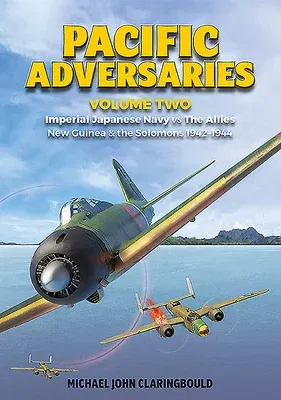This Volume Two of Pacific Adversaries conveys detailed stories of
aerial warfare in the South Pacific, chosen because both Japanese and
Allied records can be matched for an accurate accounting. Often the
actual outcomes are very different to the exaggerated claims made by
both sides upon which many traditional histories have relied to date.
Further, for each of the chosen stories photographic or other evidence
enables an accurate depiction of the aircraft involved.
Through these chosen snapshots, Pacific Adversaries will portray the
South Pacific conflict as accurately as possible. This second volume
focuses exclusively on confrontations with the Japanese Navy Air Force
(JNAF) in New Guinea and the Solomons, known to the Japanese as the
"South Seas".
The JNAF first appeared in the South Pacific in December 1941 and was at
the vanguard of offensive efforts during the course of 1942. Following
the bloody Guadalcanal campaign, the JNAF fought a largely defensive war
in New Guinea and the Solomons against increasingly powerful Allied
forces. Perhaps surprisingly, right through to the end of 1943 the JNAF
offered significant resistance to the Allies and never ceded air
superiority in the vicinity of its key base of Rabaul. Only in 1944,
when units were withdrawn to the Central Pacific and the Philippines,
was the JNAF presence in the South Pacific finally wound down to just a
token force.
Never before have detailed accounts matched up adversaries so closely
and in doing so shine light on key events in Pacific skies so many years
ago.

